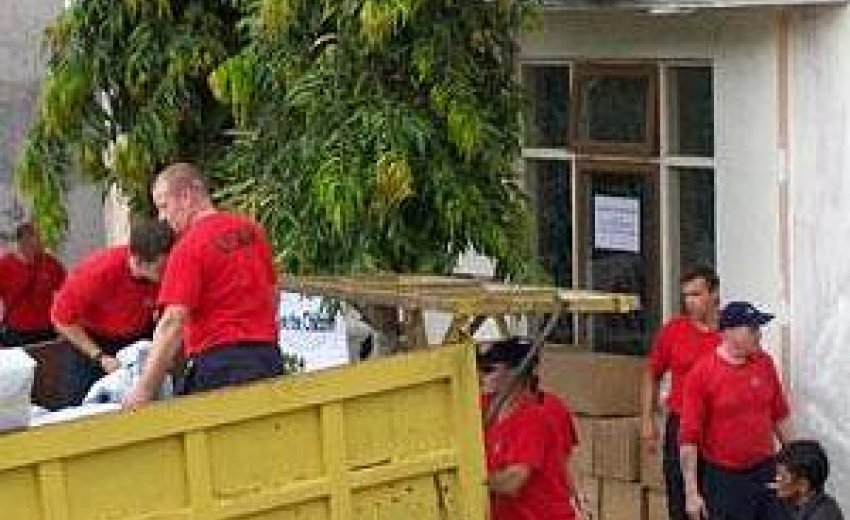 Disasters and accidents can happen at any time and anywhere in the
world, often without warning. There is a need for professional teams
that can deploy rapidly and undertake effective search and rescue
operations.
Disasters and accidents can happen at any time and anywhere in the
world, often without warning. There is a need for professional teams
that can deploy rapidly and undertake effective search and rescue
operations.
Working for the West Midlands Fire Service as a Communication Engineer when the opportunity came up to be part of The United Kingdom International Search and Rescue Team (UK ISAR), a team which is on call 24 hours a day, 365 days a year to respond to disaster anywhere in the world, I had no hesitation to put myself forward.
A team of UK Search and Rescue experts were sent to Indonesia by the U.K. Department for International Development (DFID) to help survivors of the Padang earthquake following the two consecutive earthquakes of 30 September and 1 October, 11 districts across Western Sumatra were affected with Padang (pop 900,000) and Pariaman (pop 70,000) the worst affected.
As far as I was concerned, a team had already left the U.K. from Gatwick airport so was I surprised to receive a phone call on Friday morning at 00:15 asking me to leave for Indonesia straightaway. Apparently one of my team mates fell sick and there was an opportunity for me to catch the delayed flight which had been delayed due to a hydraulic fault. A frantic 10mins packing, off to West Midland Fire Service HQ in Birmingham where transport had been arranged. The transport turned out to be a personal Police escort all the way to Gatwick airport in a black BMW unmarked police car, blue lights flashing all the way.
At Gatwick Airport we were told “The aircraft can not be fixed”, but following what a DfID spokesman called "a day of intense activity searching for an alternative aircraft", a C17 military transport aeroplane was located.
The RAF flight departed Brize Norton on Saturday 3 October carrying:
• A 63 strong UK search and rescue team (including 2 dogs), plus a DFID liaison officer, and search and rescue equipment
• A 2-person DFID humanitarian assessment team and a Shelter expert for the aid agency Care.
• 386 shelter kits and 2 million water purification tablets to be consigned to Save the Children on arrival in Padang
The flight landed in Padang at about 2.30am local time after a 2 hour
refuel stop in Dubai. As planned, the DFID Humanitarian Advisor who had
been in Padang for 3 days, was able to meet the plane and the team were
assisted by staff from the British Embassy and United Nations who fast
tracked the immigration and visa process for 80 people at the airport.
The team unloaded the plane into eight trucks, two coaches and one Land
Cruiser and left the airport for an area called Agus Salim where we set
up camp by 04:25 local, having cleared the airport with all our
equipment and relief items.
The camp was to become the base of operation and my responsibility was
to set up a Radio Communications Network, Computer network to access
the Internet and Satellite Communications back to the U.K.
Working along with the Australian search and rescue teams, 3 teams were immediately deployed to The Diatsu car sales building, koto timor district and areas north up to the town of Baso.
The UK Search & Rescue teams went into collapsed buildings where bodies still lay, and carried out search and rescue work at the scenes of big mudslides.
Grieving families in the farming
hamlet of Pulau Koto, Cumanak and Lubuk Pawesh told Nick Parker how the
village was swept under a 100ft wall of mud during the Indonesian
earthquake. A school full of children and a wedding party were among
the victims buried alive.
Firefighters searched the valley but hopes of finding survivors were
dashed after a British sniffer dog with Dog handler John Ball found no
trace of “life scents”.
They carried out search and rescue missions for the first 24 hours,
working closely with Australian rescue teams, before the Indonesian
authorities reluctantly agreed no more lives could be saved, amid the
widespread destruction and efforts were switched from life-saving to
providing aid and restoring critical services.
The UK search & Rescue teams distributed relief items supplied by
the Department of International Development including 386 tents and two
million water purification tablets. On departure UKSAR donated their
consignment of food, large Search and Rescue tents and generators to
“Save The Children Fund” for use as storage space, this alone made the
trip worthwhile.
The UK Search and Rescue teams were
a little frustrated that they didn't get to do more search and rescue
but can be proud of the fact that they did everything they could. The
team had been expecting to stay up to two weeks but with no victims
found alive, it was decided to return home.
You see film of places in earthquakes on TV, but some of the scenes we
saw were quite eye-opening – to see it actually in front of you is a
different thing. There were the damaged buildings and further afield,
where the volcanoes were, there were lots of mudslides which had
covered villages. I was proud to be given the opportunity to do my
little bit and was proud to work alongside all the 63 UK Firefighters
who went to Indonesia, especially my team consisting of Sean, Dean,
Pete, Dave, Sham & Gareth.

